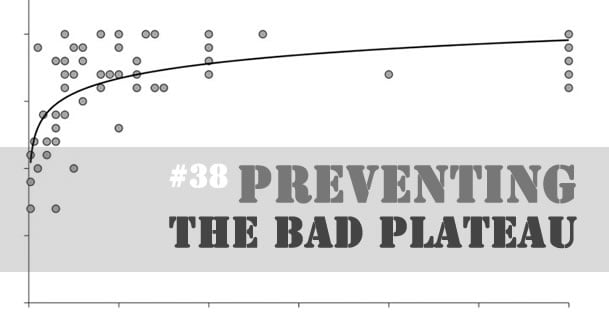Hi, [s2Get user_field=”first_name” /].
Another carryover from the original course, today. The plateau. When improvement just seems to stop to happen.
Plateaus will affect us all, sooner or later. They’re not a problem, as long as you know how to recognize and deal with them. Read on for the primer on plateaus.
Vision improvement generally happens in variable increments. Periods of no change followed by sudden moments of impermanent accommodation improvement. It is the nature of this type of change – somewhat unpredictable.
While this is all normal, we do want to avoid the troublesome plateaus.
Especially after a few months, we start to have to pay attention to our practices. What was new at first is now routine, and it is quite easy to slip into habits that lack in the type of stimulus we need. It is quite likely that you have good strain reduction practices by now. What is most commonly lacking as I see clients continue on this path, is continued awareness.
It may be worth bookmarking this session, or perhaps printing a copy of it. A monthly reminder of these practices will help you avoid the plateau – which in appearances is no different from the completely normal periods of apparent lack of change. The difference?
Plateaus appear just like normal periods of no measurable change – but they persist, halting further improvement in your vision.
This is where some guidance and ongoing changes I will introduce with the program will help you. After the first four to six months plateaus become a common challenge, and we have to continue to be vigilant to avoid them. Why all this worry about the plateau?
A plateau is hard to break out of. Once your eyes stop to respond to stimulus, additional tricks become necessary to build momentum again. This requires one-on-one work, and can not be done in this Web program format.
How do we distinguish regular slow-downs in progress, compared to the plateau?
If you are concerned that the above symptoms apply to you, use the forum to share your experience – or if you are also participating in one-on-one, just send me a quick e-mail. The sooner we take corrective measures, the less effort it will take to resume making progress.
Consider that temporary lack of progress is normal:
Think of winding up a spring. A certain amount of pressure is necessary before releasing the spring will result in noticeable force. As you do exercises, manage strain carefully, and wear optimal normalized prescriptions, stimulus continues to happen. Your physiology will resist change, periodically. It is basically a rebuilding period after the last improvement you experienced. The many interconnected aspects of your eyesight need to recover, adjust to the new reality of changed focal ability.
I like to look at logs with my in-person students, and anticipate these recovery times with reduced stimulus and temporary increased attention to minimizing strain. Even here in the Web sessions, the log will give you clues about this. If you just found yourself doing better by a centimeter or two, or your new normalized prescription gives you the same focus pulling ability as your previous one did – you need a few weeks of less stimulus, and more strain control.
If you are unsure about this, just put a note in the forum.
Let’s talk about avoiding the plateau:
The plateau tends to happen most, when there is no variation in exercise or habits. Similarly, if you stop actively partaking in focus pushing and focus pulling work, the lacking stimulus will induce a plateau. Simply resuming exercise may now yield no change at all – see the list above, you are now ‘stuck’.
Dig through the first round of session. Remember the no-focal-plane morning exercise? Maybe you stopped doing it – time to take that up again. Find some new focus pulling opportunities. Look at the installment discussing changing focal planes while focused up-close (alternating your differential prescription with using no correction at all). The customized exercises are handy as well, as they continue to change week to week. I will introduce some new ones, soon.
There are a few other key aspects to consider:
Remember that this a very complex and sensitive mechanism. Remember that your body likes to minimize exertion of energy. If change is not absolutely imperative, your physiology will always resist it. Vision rehab is a fine balance between positive stimulus and minimized strain.
A quick note in the forum of your progress may also give me pointers on where you are at – and I will be glad to make specific recommendations. You are paying for this program, you are the client, I want you to get real value from this work. Use all the resources at your disposal!
All of this is preventative, at this stage. You are still at a point where a plateau is not an immediate risk. But now is the time to be aware of this being a future challenge, especially if we are slowly moving from just having fixed some ciliary myopia and are now maybe getting into axial change – this is a slower process to begin with, and persistence is key to enjoying ongoing improvements in your eyesight.
Anytime you feel like you hit a plateau, drop me a line in the forum. We’ll investigate together!
Next up, “The Looking Glass”. I really enjoy that session, it’s premise helped me personally quite a bit when I was working on getting my eyesight back.
Cheers,
-Jake
Session: Audio Track
pending …
Session: Video Stream
pending …

